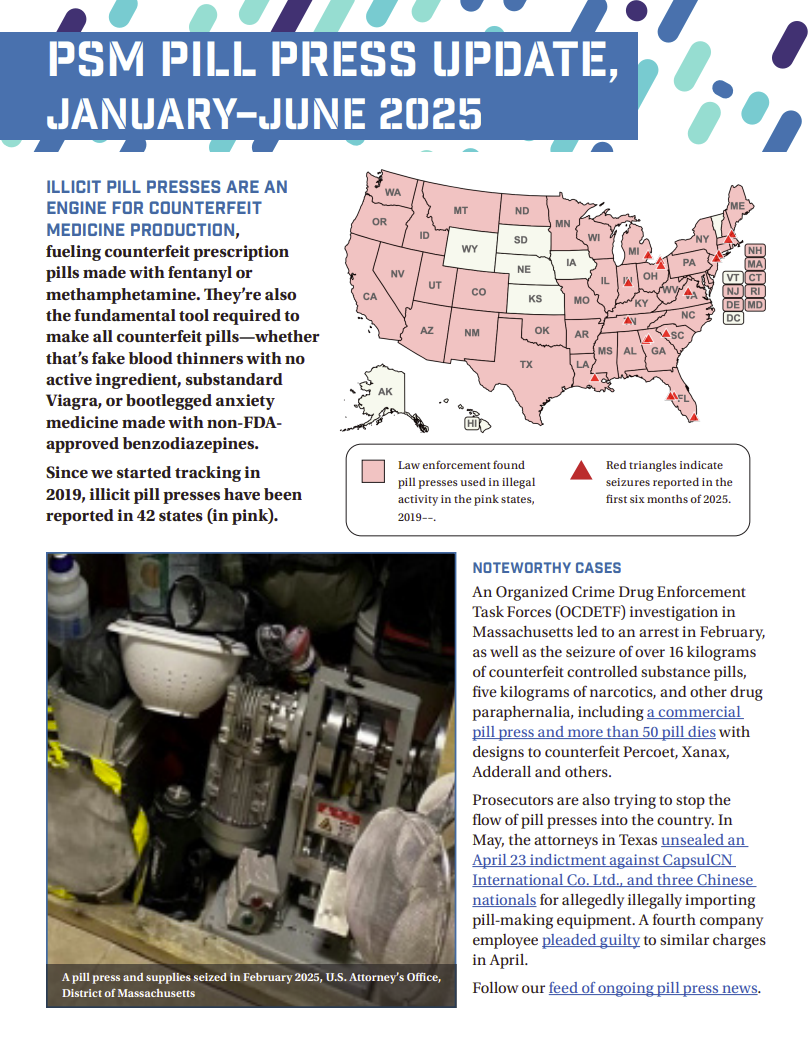November 3, 2025: Safe Chain’s Boyd brothers convicted for selling adulterated HIV medicines and falsifying drug pedigrees
Major stories
Maryland distributors were convicted for HIV drug diversion. A pill press seller from China was sentenced.
Although they had publicly asserted their innocence, Charles and Patrick Boyd, the owners of Cambridge, Maryland-based Safe Chain Solutions, have been convicted by a jury in a Florida federal court of conspiracy to introduce adulterated and misbranded drugs to defraud, conspiracy to traffic in medical products with false documentation, and conspiracy to commit wire fraud. Safe Chain was part of a network of drug sellers and distributors that sold 85,000 bottles of diverted, Gilead-branded HIV drugs to U.S. pharmacies from as early as April 2020 to August 2021.
Pharmacies received sealed, secondhand bottles with falsified pedigrees to make them look legitimate, but there was no way to know whether the pills inside them were expired or damaged. Sometimes they were the wrong medicine, such as antipsychotics that rendered one patient unable to speak or walk. The Boyds’ coconspirator, Adam Brosius, pleaded guilty in April 2025.
The June 2024 indictment shared conversation between the Boyds about poor drug quality.
Xiaofei Chen, a sales representative for a China-based equipment company, who admitted to selling pill presses and M30 molds for counterfeiting controlled substances and money laundering in April, was sentenced to 52 months in federal prison on October 31. CapsulCN International Co. Ltd. and three employees mentioned in Chen's case are also under indictment; read documents related to the second case here.
Domestic News
NABP’s Pulse has reached 30 states. A Pennsylvania woman has been charged for treating clients with animal medicine. Oregon’s pharmacist’s association asked regulators to shut down illegal compounding of GLPL-1s.
National Associations of Boards of Pharmacy’s Pulse Verification Service, which launched in 2023, has been rolled out in 30 U.S. states. The product, which helped detect a counterfeit Ozempic pen in an Arkansas pharmacy earlier this year, quickly verifies identifying data on medicines to help pharmacists identify suspect medicine.
An editorial by Brian Mayo of the Oregon State Pharmacy Association (OSPA) urged regulators to stop illegal compounding of GLP-1s, which threaten patient health and erode trust in the U.S. drug supply. OSPA is also a vocal advocate for pharmacy benefit manager (PBM) reform.

Watch PSM's 5-minute tour of Pulse from 2023
Regulators protecting patients in the news
The U.S. Food and Drug Administration posted warning letters it sent to an Ohio pharmaceutical facility for failing to adequately test drug ingredients for diethylene and ethylene glycol and microorganisms and a Chinese company that makes personal protective equipment and surgical supplies over sterility concerns.
The Rhode Island Board of Pharmacy placed AJ Pharmacy, in Providence, and its pharmacist in charge on probation after an inspection revealed expired and misbanded drugs and disorderly and unclean conditions. The same pharmacist surrendered the license of his North Providence location in August after similar inspection results.
Legislative updates
Senators Grassley and Hassan announced the reintroduction of the Stop Pills that Kill Act, which seeks to apply existing penalties for manufacturing methamphetamine to fentanyl, fentanyl analogues and counterfeit substances, and would require the Drug Enforcement Administration to create a comprehensive plan to address these drugs.
A bipartisan group in the House of Representatives introduced HB 5880, which would require regulated persons to identify tableting machines and encapsulating machines by serial number.
Keep up with state legislation in the areas of pill presses, prescription drug affordability boards, and drug importation.
Catch up on illicit pill press news.
Prescription Drug Affordability Boards (PDABs)
In September, Maryland’s PDAB considered policy approaches to lower costs for Jardiance and Farxiga and heard public comment about upper payment limits for these drugs. Oregon’s PDAB discussed potential policy recommendations for its annual legislative report and reviewed high-level information about Jardiance, Mounjaro, Ozempic, Rybelsus and Trulicity. Read about these meetings in our September Prescription Drug Affordability Board Activity post.
Medspas and wellness clinics
U.S Attorneys in western Pennsylvania charged a wellness counselor who operated two weight-loss clinics in Pittsburgh with providing her clients with injections of veterinary prescription drug Chorulon, which treats cows suffering from chronic heats, instead of FDA-approved human chorionic gonadotropin (HCG). The defendant, who is not a licensed medical professional, allegedly directed an employee to order the drug from an Illinois supplier, and dispensed it in syringes to clinic clients without appropriate labels. The FDA characterizes HCG as dangerous and ineffective for weight loss.

Why did Ohio's Board of Pharmacy suspended this clinic? Watch.
International News
The RCMP busted a pill press operation in Ontario.
The Royal Canadian Mounted Police in Ontario reported seizing a pill press, drug recipes, flasks and chemical glassware and nearly $10 million worth of synthetic drugs in a large-scale drug lab investigation on September 7.
Authorities in Cyprus warned about a new barrage of fake diabetes cures being sold online.
In India, the Telangana Drug Control Laboratory identified ten substandard medicines, including counterfeit amoxycillin & potassium clavulanate tablets and fake tramadol pills.


